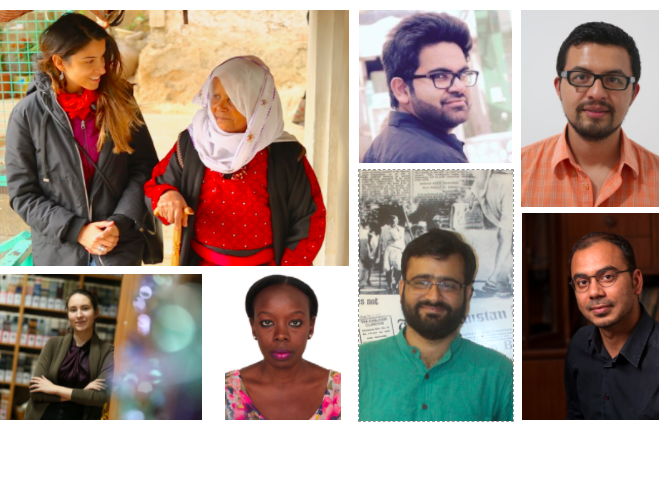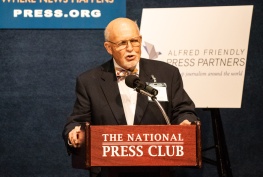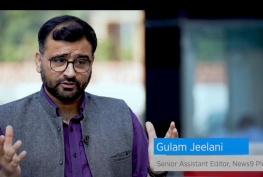The 13 reporters, editors and broadcasters chosen for Alfred Friendly fellowships this year come with noble aspirations to uplift journalism in their home countries, despite facing a myriad of professional challenges, ranging from civil war and high crime to censorship and widespread corruption.
The fellows will spend six weeks learning at the Missouri School of Journalism from more than a dozen faculty, all professional journalists with extensive experience, and five months getting hands-on experience in coveted American newsrooms. They’ll return with the skills and knowledge they need to become more effective journalists and leaders in their profession.
Four come from some of the most difficult countries to practice journalism in the world — Sudan, Mexico, Jordan, and Ukraine — and three come from India, where journalists face increasing censorship, ultranationalism and threats to civil society. Six come from Macedonia and will participate in the three-week-long initial training in the spring and work in newsrooms for six weeks.
Farah Ajlouni | Jordan
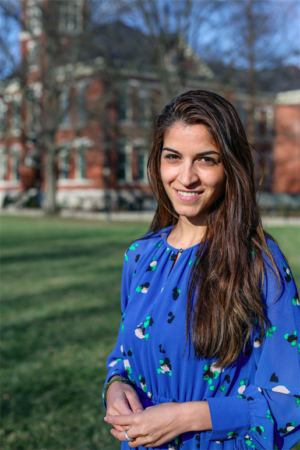
A news anchor and correspondent for Jordan TV’s daily English news program, Farah Ajlouni was raised in France, Chile and Italy as an ambassador’s daughter but went against her family’s wishes to become a journalist. She has reported on issues ranging from the Syrian refugee crisis to farmers facing irrigation problems. She also started a handcrafted goods non-profit to benefit poor Jordanians.
Ajlouni considers herself a “global citizen.” She aspires to not just report on the struggles and desperate situations in Jordan, but to engage with her audience and inspire viewers “to overcome difficulties and become active members of the society, maximizing their potential to achieve success.”
“Over time, rather than just covering a story, I used my journalistic instinct to identify people or communities I can help, to reduce poverty and empower women,” she wrote in her application.
Ajlouni sparked a national debate on the conditions for women in Syria after the station broadcast her interview of a refugee who had been raped. “The story helped me understand I have access to a tool that could be leveraged to help others,” she said. “But I also need to improve my own skills to be able to better tell their stories.”
While journalists in Jordan face intimidation, arrest, and imprisonment for writing articles deemed unfavorable by the government, Ajlouni said there are opportunities to “soften the gag orders” and to do stories that can influence new policies and highlight injustices.
Ajlouni has contributed political and financial stories as a freelance reporter and producer for The Telegraph and Al Jazeera and for other television stations in the Middle East and Europe.
Ajlouni, our second Daniel Pearl Fellow, will work at 60 Minutes.
Samarth Bansal | India
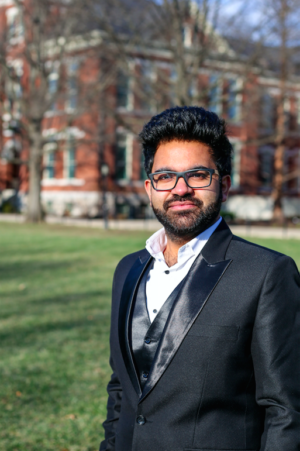
A data journalist with Hindustan Times in New Delhi, Samarth Bansal is dedicated to forceful investigative and data-driven reporting. He is also part of a tight-knit group of data journalists and programmers who are using innovative interactive data visualizations to improve how they tell stories online. His stories include an investigation of a fraudulent job placement network in Delhi and the creation of a Women Empowerment Index.
Bansal had many lucrative career opportunities after graduating from college with a degree in mathematics and scientific computing, but he pursued journalism out of an innate desire for social justice and checks on power.
“As a software engineer with a degree from one of India’s most prestigious engineering colleges, he could have landed a higher paying job at a technology company,” Bansal’s editor, Harry Stevens, wrote. “But he chose journalism because he is passionate about working for the public good, striving to understand and explain the world to people, and speaking truth to power.”
Bansal uses data as an effective tool for government accountability. In March 2016, his data-driven investigation on the Indian government’s exaggerated claims of rural electrification forced India’s Union Power Minister to acknowledge the findings of his report.
“Stories matter,” Bansal wrote in his application. “A democracy can’t exist without the presence of a strong and independent press. That thought alone motivates me to become a better journalist.”
Bansal will work for The Wall Street Journal.
Juan Luis Garcia | Mexico
 Working in the most unsafe country to do journalism in North America, Juan Luis Garcia’s coverage has focused on crime and security — including the spread of the drug cartels, local government agencies linked to crime organizations and federal government corruption.
Working in the most unsafe country to do journalism in North America, Juan Luis Garcia’s coverage has focused on crime and security — including the spread of the drug cartels, local government agencies linked to crime organizations and federal government corruption.
As a reporter in Mexico City with SinEmbargo, an online news outlet considered a standout in Mexico’s new generation of digital media startups, Garcia has distinguished himself by seeking explanations for the causes of violence beyond the single criminal acts.
“I am interested in being able to explain complex issues without losing an understandable message for our readers,” Garcia wrote. “There is no more proficient way to improve that than working side by side with colleagues.”
Garcia also writes about the intersections of politics and business.
Garcia’s editor-in-chief, Antonio Hernandez, points out the danger of that intersection: “It is well documented that some of the local and federal politicians are being financially supported by drug trafficking.”
At the online news site ContraPoder, he covered companies, markets and entrepreneurship. At SinEmbargo, he’s also written an in-depth article on fracking in Mexico, with data, and the lobbying of members of Mexico’s Congress by big soda companies to stop tax measures.
As Garcia’s former supervisor, Octavio Lopez, put it, “It is always atypical to defy power in the America’s most dangerous country for journalism.” Garcia, he wrote, is emotionally mature and disciplined and “willing to do what is necessary to become a better journalist (including learning database management)… He already likes to share with his teammates, thus I bet his new knowledge once he comes back will be useful for Sin Embargo and hopefully for Mexico.”
Garcia, the Patrick and Janna Stueve Foundation Fellow, will work during the first half of the fellowship at the Miami Herald and its Spanish language newspaper, El Nuevo Herald, and at the Texas Tribune, an innovative digital outlet, during the second half.
Gulam Jeelani | India

From a modest upbringing in the Kashmir Valley, Gulam Jeelani has distinguished himself in his work as a Special Correspondent for Hindustan Times in New Delhi. As a member of the newspaper’s national affairs team, he has covered state elections in Uttar Pradesh, Punjab and Gujarat, and politics under the ruling party. He has also coordinated teams of reporters, editors and photojournalists for the newspaper and is passionate about development and socio-economic issues in New Delhi.
In the first three years of studying in [university], I developed an urge to express myself and try to be an active participant for social change,” Jeelani wrote. “I was also overwhelmed to see poor Muslim students from far off places such as Bihar, West Bengal and Uttar Pradesh, make full use of the university and end up becoming academicians, doctors, engineers and bureaucrats.”
Jeelani takes his political coverage to a new level. He wrote a series of stories tracking the population of people living alongside the river beds in election-bound Uttar Pradesh, to see
if the deteriorating condition of the rivers posed a problem at the polls. He also spent a day hitchhiking through Punjab to understand the elections from the eyes of truck drivers in the north Indian state.
“As someone with an interest in politics and empathy for victims of conflict and other kinds of violence, I wish to move ahead in life and feed my urge to express myself and be part of the change by telling stories,” Jeelani wrote.
Jeelani is the Frank Islam & Debbie Driesman Foundation Fellow and he will work the Minneapolis Star Tribune.
Ankur Paliwal | India
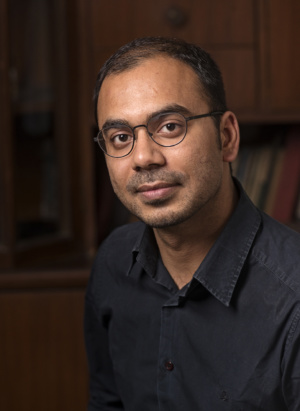
A freelance science journalist in New Delhi, Ankur Paliwal, will be the inaugural Food Security Fellow, an enterprise that includes rigorous academic elements, field trips and advanced reporting projects.
Ankur has written investigative articles on science, health and environmental issues throughout the country, including the death of children to mysterious fever and the government’s mishandling of critically polluted areas. He also won the Next Generation of Science Journalists Award in 2017 at the World Health Summit in Berlin. Paliwal will be pioneering a new specialization in our fellowship focusing on food security issues.
“I believe science can greatly enrich stories from various beats — be it health, environment, education, politics or crime,” Paliwal wrote in his application. “I am determined to shape the discourse of science journalism in India by making science personal to people.”
Paliwal’s work has already made an impact in India. His investigation into unethical drug trials conducted by multinational pharmaceutical companies led to a public interest petition in the Indian Supreme Court and increased regulation of drug trials in the country. His exposé about false commissioning of solar power projects in western India led to the government plugging a policy loophole, which developers had been exploiting to their benefit. Still, Paliwal believes his journalism can do more.
“I know I have the potential to write compelling stories,” he wrote. “I just need to work with good journalists and editors to learn from them the process of how powerful stories are reported and written. I aim to absorb as much as I can during the fellowship and come back to India to share those skills with journalists here.”
Paliwal will spend eight weeks learning and training at the University of Missouri and the Missouri School of Journalism and another two weeks at a prestigious plant science center. He will work at Scientific American magazine and with both the Pulitzer Center and Undark, a digital science news magazine.
Zeinab Salih | Sudan
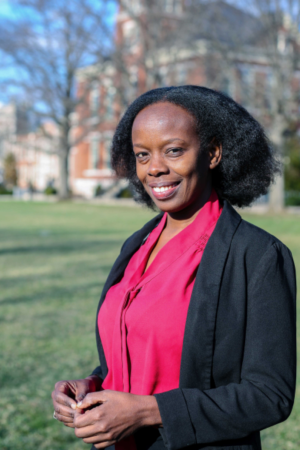 Zeinab Salih, an award-winning journalist from Khartoum, has written about women’s rights, the oppression of religious minorities and the recent wars — even though coverage of the rebellion is outlawed in Sudan and the government severely censors media reports. She has also managed to write articles about human trafficking, a cholera epidemic, environmental problems and corruption.
Zeinab Salih, an award-winning journalist from Khartoum, has written about women’s rights, the oppression of religious minorities and the recent wars — even though coverage of the rebellion is outlawed in Sudan and the government severely censors media reports. She has also managed to write articles about human trafficking, a cholera epidemic, environmental problems and corruption.
“My country has known decades of war and civil strife — even before independence from Great Britain in 1955,” Salih wrote in her application. “I believe the main reason for ongoing conflicts in Sudan is because we do not really know each other and lack the information that would lead to greater respect for our diversity.”
In May 2008, Salih and three of her colleagues were captured and imprisoned in Abyei, a disputed area between northern and southern Sudan, while reporting on the ethnic conflict between the Misseriya Arabs and ethnic Dinka there. They were the first domestic journalists to attempt to report on the problems and poor conditions facing the Misseriya. Neither this experience, nor subsequent arrests, could not keep Salih from pursuing her aspirations.
“I want to help the Sudanese people to know each other better by enabling journalists to tell stories that haven’t yet been told,” she said.
Salih has written on political, social, and economic issues in Sudan, Saudi Arabia and Somaliland for international publications including The Guardian and The New York Times.
A Daniel Pearl Foundation Fellow, Salih will work at U.S. News & World Report in Washington, D.C., and contribute to international publications.
Anna Yakutenko | Ukraine
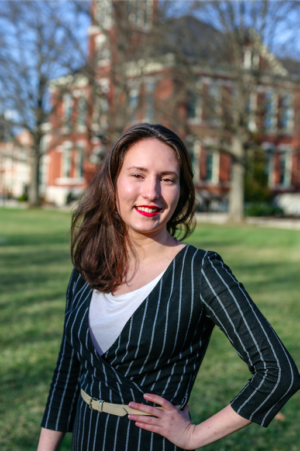 As a reporter at the Kyiv Post, Anna Yakutenko has primarily covered social problems throughout Ukraine. She was a lead reporters for a Journalism of Tolerance project that highlighted challenges faced by sexual, ethnic and other minorities in the country, as well as people with physical disabilities and those living in poverty. She also covered social changes in war-damaged areas of Eastern Ukraine.
As a reporter at the Kyiv Post, Anna Yakutenko has primarily covered social problems throughout Ukraine. She was a lead reporters for a Journalism of Tolerance project that highlighted challenges faced by sexual, ethnic and other minorities in the country, as well as people with physical disabilities and those living in poverty. She also covered social changes in war-damaged areas of Eastern Ukraine.
Yakutenko spearheads many of the Post’s innovative efforts. She produces KP Podcast, a program that discusses the most important stories of the week/month by interviewing the journalists who cover them. She is also the primary reporter for their video department, which is currently making a series of interviews with successful young Ukrainians.
“I think that the Kyiv Post has already taught me the most vital things the journalism profession requires – the ability to find interesting and important stories and convey them in the most accurate and honest form,” Yakutenko wrote in her application. “What I am looking for now is a way to improve my video toolkit to be able to tell those stories in another format.”
Yakutenko, the fifth-consecutive Fellow from the Kyiv Post, will work at KCUR, the National Public Radio affiliate in Kansas City, and the Chicago Tribune.

